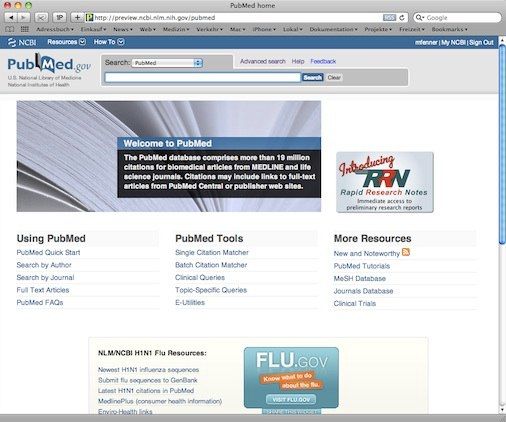Earlier this month I gave this talk in my department. It is basically a summary of two blog posts that I wrote in October during Open Access Week (Open Access Week: a researcher's perspective part I and part II), and I had given a similar talk in November in an Open Access workshop organized by the Helmholtz Association.
Messaggi di Rogue Scholar
Last week the New England Journal of Medicine (NEJM) published a paper on selective outcome reporting in clinical trials (Vedula et al. 2009). The primary and secondary outcome(s) of a clinical trial could for example be survival in cancer patients or rate of heart attacks and other cardiovascular events in patients taking cholesterol-lowering drugs.
In September PLoS started to show usage data (downloads, citations, but also use of social bookmarking services and blog posts) for all their published papers (article-level metrics at PLoS: addition of usage data). PLoS is not the first publisher to do that, but certainly the largest to date.
This week (October 19-23) is Open Access Week – a good opportunity to think and write about this topic. On Monday I wrote in a blog post: In that blog post I then wrote about the role of the researcher as a reader. Now I want to look at the perspective of the researcher as an author.
This week (October 19-23) is Open Access Week: Open Access Week is an opportunity to broaden awareness and understanding of Open Access to research, including access policies from all types of research funders, within the international higher education community and the general public. The following video from SPARC (the Scholarly Publishing &

It was Anna Kushnir who started it all. Frustrated with the limitations of PubMed when finishing her PhD thesis, she wrote a blog post in March 2008 (I Am Not Yelling. Not Out Loud.) about her experience. The blog post created quite a stir in the blogosphere, especially among science librarians.
Last year Elsevier started the Article 2.0 Contest and asked for the best ideas on how research articles should be presented on the web. The winners were announced March 31: Inigo Surguy from 67 Bricks won first prize . His application used enhanced content navigation and allowed adding semantic data to the article as well as commenting on specific parts of the article.
The term digital divide usually describes the troubling gap between those who use computers and the Internet and those who do not (Wikipedia). Many if not most scientists are experienced users of computers and the internet, and use email or public databases such as PubMed on a daily basis.
Reference managers are essential tools to read and write scholarly papers. In the last few years we have seen both a number of new reference managers (most of them web-based), but also a trend for the established reference managers to gain social networking features. More choice is great, but it also creates confusion about the right tool to use.
Now that we have a number of online reference managers to choose from, I thought it would be interesting to look at their popularity – both in absolute numbers of visitors and the in changes during the last 12 months. Online tools such as Compete allow everybody to do just that, and their basic functions are free to use.